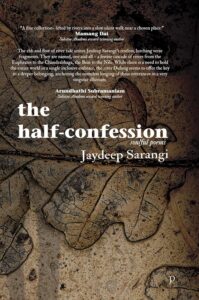
The Half-Confession – Soulful Poems by Jaydeep Sarangi (Penprints 2024)
Reviewed by Amit Shankar Saha
“I hold all pains in my silent palms
I begin collecting, revisiting
the milk white flowers of the morning.” (“Speaking with My Unspoken Words”)
These are the first three lines of the opening poem of Jaydeep Sarangi’s volume of poems titled The Half-Confession. The sub-title of the volume says that these are soulful poems and Mamang Dai in her blurb writes: “A fine collection – lifted by rivers into a slow silent walk near a chosen place.” Love, life and history form a tapestry here in these poems with the metaphor of the rivers predominating. Sarangi is a poet who can write “If I am on a lean bed unattended for long/ call me ‘poet’, leave the window wide open!” (“The Window Seduces My Love”) This awareness of being a poet and the sense of posterity come with experience and Sarangi has acquired that experience though his previous eleven collections of poems in English. He has become somber and aged with wisdom and can say “Let me go to the hilltop – I make friends with loneliness” (“Watching”). Every poem is a foray into autobiography but also a trajectory away from the personal, going into an abstraction that at times is difficult to grasp and awaits a moment of epiphany.
His poems travel the ruins of Akrotiri and Mohenjo-daro; flow past the Nile, the Indus, the Ganges and the Jordan; visit Jhargram and Konark, Kolkata and Pataliputra; talk with Anubis and Cleopatra, Artemis and King Menes. And then there are the rivers with Dulung being the primary focus. He says, “Dulung is my truest self, forever panting for more/ flowing home, its water holds me like its leaf strong” (“A River to Die On”) and later “Stand near the banks of the Dulung, speak to me/ forests deep, time arrives at your red lips” (“If You Ever Visit Jhargram”). Arundhati Subramaniam in her blurb writes that “The ebb and flow of river tide unites Jaydeep Sarangi’s restless, lurching verse fragments.” Teesta, Beas, Chandrabhaga, Yamuna and others too make their presence along with the rivers of voices. Among all these there is a simmering tension of love:
You are one call away to my breakfast here.
Your morning poem is a cup of brewing images.
I desperately wish for all matters impossible
as you sit here by me counting months fly by.
Get your phone, call me now. Have your breakfast
with me near the river you choose to live by. (“One Breakfast Away”)
He starts the poem “No Forgetting” with these lines which become memorable: “Today, at this hour,/ if little by little you stop loving me/ I shall be loving you more, step by step” and he ends the poem “Come What May” with an even more memorable and enigmatic line: “We will walk together for two thousand years.”
Jaydeep Sarangi has this felicity to weave sadness and life together into a poetic whole that transcends both the constituents and becomes something more than their sum. In the poem titled “Untitled Hope” he writes, “I know not how memories fly/ like bees, between leaves/ to sing green songs for you” and in the poem titled “The Map-Maker”, written for Keki N. Daruwalla, he writes, “between the soul and the night river – / the doors swing open across the years.” Not all his poems in this volume are easy to comprehend because they take the readers into a passage of diffused light where there is neither any secret nor any confession but an indeterminate, indefinite and uncertain space of what can be called half-confessions.